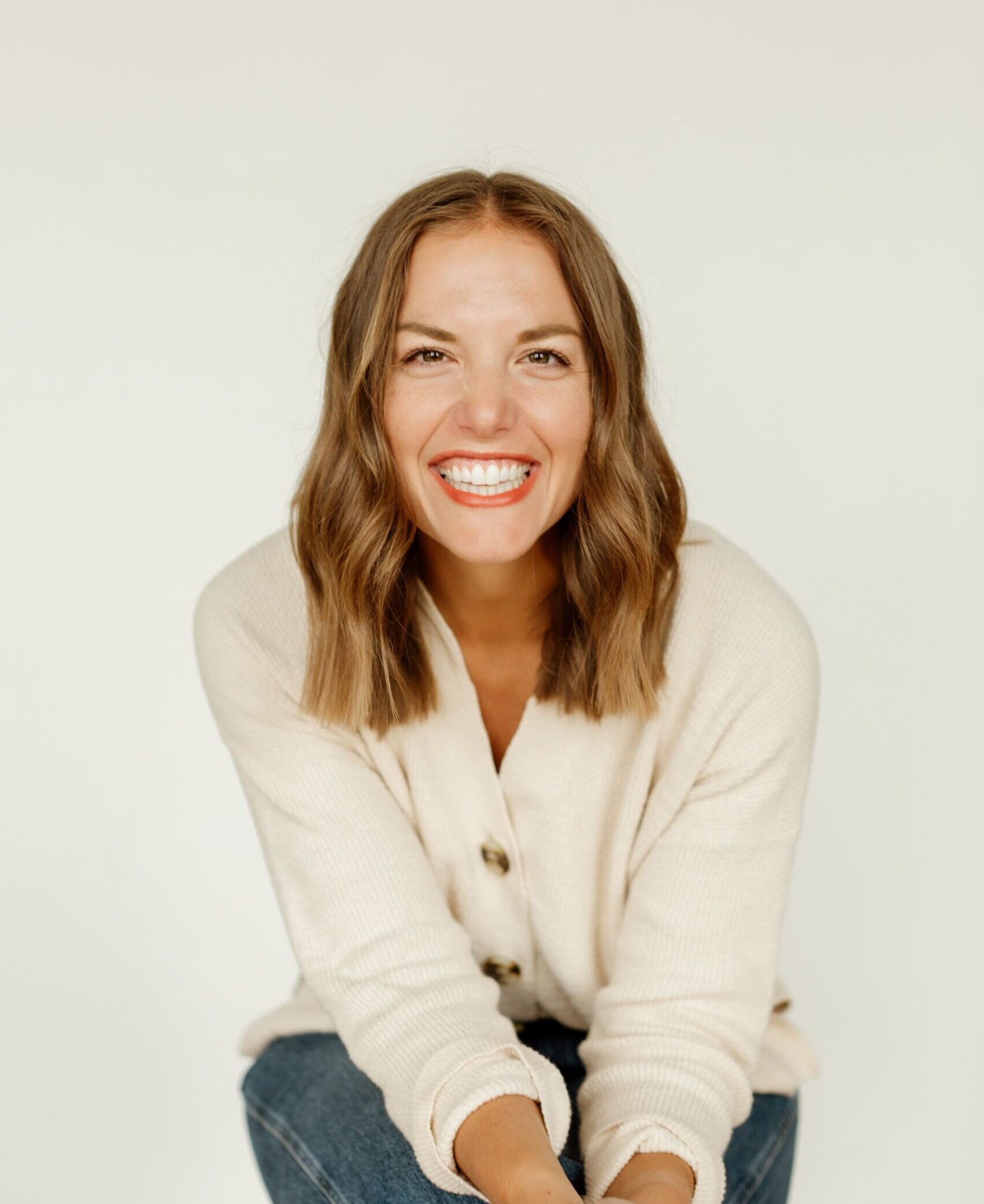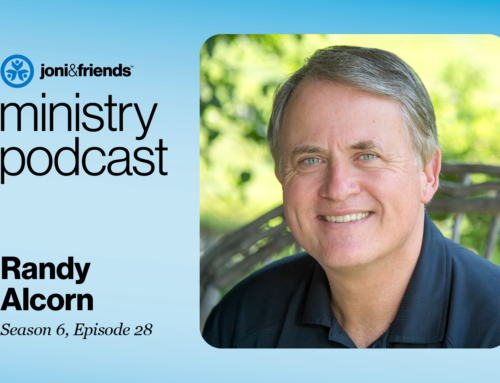Talking About Disability with Children
Subscribe to the Joni and Friends Ministry Podcast

Do you know how to talk to children about disability?
Bestselling author Laura Wifler wants to help you talk about disability, inclusion, and friendship with the children in your life. Laura is the cofounder and Executive Director for Risen Motherhood, a nonprofit that brings Gospel hope to moms.
She joins the podcast to share about her journey as a mother raising a child with disabilities, and to introduce her children’s book, Like Me: A Story About Disability and Discovering God’s Image in Every Person.
Laura’s Story…
Matthew 6:33–34: “Seek first his kingdom and his righteousness, and all these things will be given to you as well. Therefore do not worry about tomorrow, for tomorrow will worry about itself. Each day has enough trouble of its own.”
Laura and her husband have three children. Their daughter, Eden, has a rare genetic condition that causes global developmental delays. Laura recalls receiving Eden’s diagnosis, along with a long list of symptoms and struggles she would likely face throughout her life. Having walked through many “valleys” of disability, Laura shares advice for other parents facing a difficult season—a diagnosis, a new disability, or any other significant struggle.
“I know for any parent who is walking through disability, especially someone who perhaps is going through diagnosis, or is at the beginning stages of getting used to what life might look like, one of the big things for me was learning to not grieve what I haven’t been asked to grieve yet….
So my biggest encouragement for parents is to just remind themselves that tomorrow has enough worries of its own—and God has grace that will meet you in that moment,” says Laura.
A Lonely Road
Laura knows how living with disability can breed loneliness. Her daughter Eden’s condition is so rare that doctors don’t know if there is another case like hers in the world. And whether a child is living with Down syndrome, autism, or a one-of-a-kind condition, isolation can easily creep in.
As Laura says: “It can just be a really lonely road because things present themselves so differently and every child develops at their own pace. Yet, my encouragement would be to find other people that are walking a similar path. Don’t expect it to be exactly the same. Don’t expect everyone to understand or for there to be a cookie-cutter experience.”
Even if no other parent shares the same experience, Laura encourages all special needs families to seek out meaningful community and places of belonging. Unfortunately, Laura points out, people can get a little nervous around disabilities. But even if a friend or acquaintance doesn’t understand disability, there can be other ways to deepen a relationship and find common ground.
As Laura says: “I have found great hope, even with friends who may not understand the fact that I have a child with disabilities and all the intricacies of that. But they do know what it’s like to grieve. They do know sorrow, they do know pain, and so I have found great encouragement from them as we seek Scripture together, as we look to the Lord, and we remind each other of the walk that we’re on, and the hope of heaven that awaits us.”
Inclusion: More than Making Space
Laura points out that while our culture has moved toward including people with disabilities, “inclusion often looks a bit more like tolerance.” To some, “inclusion” looks like a list of checked boxes: ADA requirements met, a wheelchair ramp, a room for children with sensory disorders, etc. Laura would like to see culture, and the church in particular, move from just “making space” to fostering friendship.
As she puts it: “What that means is that maybe we’re altering the games at youth group so that a child with disabilities can participate. Or that means, you know, more than a simple smile. Maybe we’re going up to someone and maybe it’s someone who’s non-verbal and we’re just placing our hand on their shoulder for a few moments.”
For parents of children without disabilities, fostering friendship with peers who do have disabilities takes effort. When a child doesn’t understand disability and asks what feels like an uncomfortable question about how a person with a disability looks or acts, or wonders aloud about their wheelchair, Laura offers advice—to act against the instinct to shush a child or steer them away from the situation.
As she says: “Your child is looking to you to tell them how to categorize the world. That’s one of our jobs as parents, is to help our kids know what is safe, what is unsafe, what’s good, what’s bad, what’s right, what’s wrong. And so if we shush our children and kind of hustle them out of there, we’re actually kind of indicating to them that, oh, this is bad. This is a secret. We don’t talk about this. This is not good.
So instead we can give them a warm smile. We can move actually toward that person and we can show the child and say, ‘Hey, that’s actually a wheelchair that helps that person get where they want to go. That gives them freedom.’”
Recognizing the Image of God in all People
Genesis 1:26–27: “Then God said, ‘Let us make mankind in our image, in our likeness, so that they may rule over the fish in the sea and the birds in the sky, over the livestock and all the wild animals, and over all the creatures that move along the ground.’ So God created mankind in his own image, in the image of God he created them; male and female he created them.”
Theology of disability might not seem like a topic for children at first glance, but Laura challenges parents and churches to teach children how to find their identities in Christ. If a child can say, “I know who I am in Christ and what I can do for Christ,” they will have the security and confidence to form relationships with others. With a secure identity, and a grasp that every person’s value and identity comes from Christ, children will be better prepared to connect with peers who don’t look, think, or act like them.
“And then what I like to do is encourage parents to show sameness… So we can show them and say something like, ‘Oh, that wheelchair’s blue. Isn’t that cool? That’s your favorite color.’ Or, ‘Oh, those braces, they have footballs on them. Remember that football game we went to last week, wasn’t that so fun?’ And so we can find these natural, just small connections.”
Laura
In her children’s book, Like Me: A Story About Disability and Discovering God’s Image in Every Person, Laura aims to create understanding between children with disabilities and their typically developing peers. The story follows a child with disabilities and his sibling as they go through their day. Laura’s hope is that the story will open up meaningful conversations and help typically developing children understand disability and befriend people with disabilities in their own lives.
“God made you. God loves you. God is kind to you.”
The words, “God made you. God loves you. God is kind to you,” came from a prayer of Laura’s that her children would grasp the love of God and find their identities in him. For all children, whether or not they live with disabilities, understanding (in whatever way possible) that they are loved and valued by God paves the way for a security and loving relationships in the future.
Laura says, “I think if we can reach our children at a really young age with something to remind them of the real truths in their lives, we are doing them a service as they grow up, and they can hopefully recall these truths and lean on them.”

God Made Me Unique
Help show a child in your life that God creates every person in his image and each individual has tremendous value, regardless of his or her appearance or abilities.








